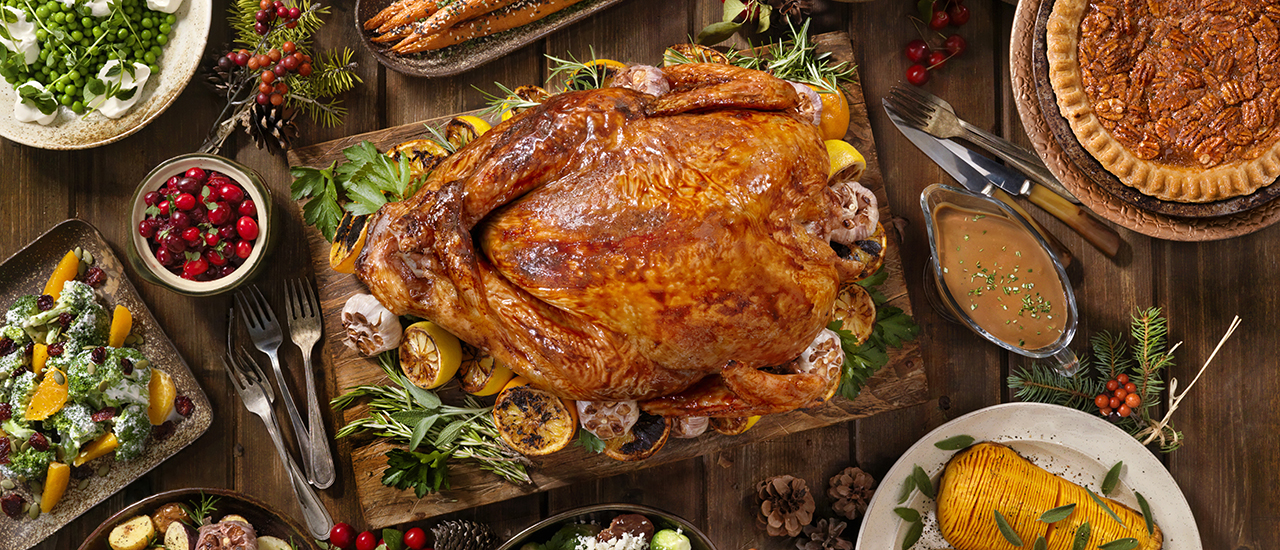
By Victoria Beechum
Good food is part of what makes the holiday season special. Holiday feasts and parties often bring us together with friends and family. They’re a time to savor and indulge. Behold, the endless parade of plentiful, decadent, high-calorie, low-nutrient comfort food! What to do?
Let yourself indulge, but keep balance in mind
“We have a saying in the Winnipeg Regional Health Authority Foods and Nutrition Services: It’s all about balance,” says dietitian Amy Campbell.
Balance means letting go of restrictive eating, denial and guilt without giving in to constant overeating.
“It’s important to recognize that indulging is normal, and overeating, at times, is normal too,” says Campbell. “It’s also important not to feel guilty about indulging. That’s what gets those thoughts churning that contribute to negative body image, which can fuel further poor choices and lead to feelings of shame.”
If indulging makes you feel uncomfortable, physically or emotionally, then it’s important to practice letting go of the guilt. Engage in an activity that makes you feel good and gets your endorphins going. Take a brisk walk, watch a or scary movie, join an exercise class, lace up your skates, strap on some skis, go sledding, or build a snowman.
“Some advice out there recommends you not go to a holiday party hungry, because you’ll overeat,” says Campbell. Instead, she advises, “Go hungry! Why go to a party and not enjoy the food? Eat what you want and be okay with it. Trying to deny yourself often triggers a knee-jerk reaction to overeat.”
Best practices for the proudly indulgent
Pick your favourite foods, enjoy them, and then move on to the other activities the party has to offer. Resist the urge to park yourself next to dessert tray or buffet for the entire night. Approaching the holiday season with balance means there are no forbidden foods—and that overeating, for a meal or for a day, doesn’t mean you have to eat like that all day, every day, for the entire season.
A healthy, balanced diet lets you nourish yourself with nutrient-dense foods most of the time and indulge in calorie-rich, for-pleasure-only foods some of the time, too!
To that end, please enjoy our decadent cheesecake recipe in the spirit of the holidays, and give yourself permission, if you need it, to indulge.
 Recipe
Recipe
Mini Praline Cheesecakes
INGREDIENTS
- 1/3 cup (75 mL) chopped pecans
- 8 oz (250 g) light cream cheese
- 2/3 cup (150 mL) lightly packed brown sugar
- 1 egg
- 2 tsp (10 mL) vanilla extract
- 12 pecan halves, cut in half
DIRECTIONS
- Preheat oven to 350°F (180°C). Line a 24-cup mini muffin pan with paper cups.
- Divide chopped pecans evenly among muffin cups. Set aside.
- In food processor, process cream cheese and brown sugar for about 15 seconds or until well blended. Scrape down sides of bowl. Add egg and vanilla; process until well blended.
- Divide cheese mixture evenly among muffin cups. Bake in preheated oven for 10 minutes or until set and small cracks form on tops of cheesecakes. Top each with 1 pecan piece. Let cool in pan on a wire rack. Cover and refrigerate for at least 3 hours, until chilled, or for up to 12 hours.
Makes 24 mini cheesecakes. Serving size: 2 cheesecakes.
- Tip: This recipe doubles easily. Bake in top and bottom thirds of oven and rotate pans partway through baking.
- Variations: Make mini strawberry cheesecakes instead. Omit the pecans, use granulated sugar instead of brown, use lemon juice instead of vanilla, and top with a hulled strawberry.
NUTRIENTS PER SERVING
- Calories 123
- Fat 7.3 g
- Saturated Fat 2.7 g
- Sodium 71 mg (3% DV)
- Carbohydrate 12 g
- Fiber 0 g (0% DV)
- Protein 3 g
- Calcium 37 mg (3% DV)
- Iron 0.7 mg (5% DV)
Source: Melanie Ksienski, Dietitian, Alberta
Normal eating is…
- Going to the table hungry and eating until you are satisfied.
- Being able to choose food you enjoy and eat it and truly get enough of it—not just stop eating because you think you should.
- Being able to give some thought to your food selection so you get nutritious food, but not being so wary and restrictive that you miss out on enjoyable food.
- Giving yourself permission to eat sometimes because you are happy, sad or bored, or just because it feels good.
- Mostly three meals a day, or four or five, or it can be choosing to munch along the way.
- Leaving some cookies on the plate because you know you can have some again tomorrow, or eating more now because they taste so wonderful.
- Overeating at times, feeling stuffed and uncomfortable. And under-eating at times and wishing you had more.
- Trusting your body to make up for your mistakes in eating. Normal eating takes up some of your time and attention, but keeps its place as only one important area of your life.
- It varies in response to your hunger, your schedule, your proximity to food and your feelings.
Source: https://www.ellynsatterinstitute.org/how-to-eat/adult-eating-and-weight/#what-is-normal-eating
I overate. Now what?
Overeating is a part of normal eating. With that in mind, here are a few tips we’ve adapted from Canadian nutritionist Abby Langer’s to help you get back on track after overeating.
- Get rid of those leftovers (especially the desserts).
We’ve all stared at a strategically packed fridge after hosting a holiday party and felt a mixture of glee and overwhelming responsibility at the enormous task of eating all the leftovers before they expire. Give yourself a break and either distribute the leftovers among your party guests, or freeze them so you can incorporate them more reasonably into your meal planning. - Get moving.
The holidays are not just for eating, though many of the traditions that gather us do feature food. Remember to indulge in the other gifts that the holidays, and winter, have to offer. Build a snowman, go sledding or ice-skating. Talk a brisk walk with your loved ones and take in the beauty of sunlight or moonlight on snow. - Drink plenty!
Of water. And eat your veggies, too. - Don’t skip meals.
We all know someone who doesn’t eat all day before a big meal to “save room” for the holiday meal, or who cleanses after the holidays to make up for their indulgences. Don’t do it. Eat your regular meals at your usual intervals, and as long as you are making mostly healthy choices, most of the time, your body is a perfectly capable self-correcting machine.
Source: https://abbylangernutrition.com/how-to-get-back-on-track-after-overeating/
Recent News

Embracing Hope: The Impact of DLC’s Movement Disorder Clinic

Winnipeg Jets Parkinson’s Disease Awareness Game!

